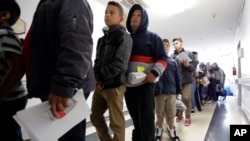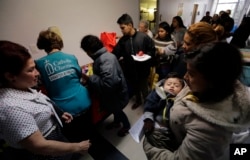A drastic increase in the number of families seeking asylum along the Texas-Mexico border has caused immigration agents to transport many of the people to Arizona, a newspaper says.
The Arizona Republic reports that U.S. immigration officials are taking families who were detained in El Paso, Texas, and transporting them 300 miles (483 kilometers) to Tucson, Arizona.
Immigration and Customs Enforcement agents transported 398 asylum seekers from El Paso to Tucson between Feb. 16 and Feb. 18. Tucson-area Border Patrol stations accepting the families are in Willcox, Naco and Douglas.
All the families transported in February were expected to be released into the custody of relatives in the U.S. and were transported to the stations before heading to relatives' locations, the newspaper said.
More than 76,000 migrants crossed the U.S.-Mexico border last month, more than twice the number from the same period last year. In the past few months, 70 groups of more than 100 people crossed illegally.
Government figures show the number of immigrants apprehended while traveling as families in the El Paso region has gone up nearly 1,700 percent in the first five months of the current fiscal year over the same period last year.
El Paso is now the second-busiest crossing point along the southwestern U.S. border behind the Rio Grande Valley. The city's shelters have been unable to house all the newly released families and many found themselves on the streets in search of transportation.
Tucson shelters are taking on much of the burden. In the past month, one shelter has taken in more than 1,100 mostly Central American families released from detention. A charity director said she would not be surprised if more families were released into the care of shelters.





